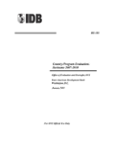Country Program Evaluation: Suriname (2007-2010)
Date
Jan 2011
This evaluation examines the IDB's Country Program with Suriname for the 2007-2010 period. During this period, Suriname has been characterized by good economic performance largely due to prudent macroeconomic and debt management coupled with a world-wide commodity boom. Nonetheless, given data paucity, it is unclear whether the recent boom was targeted enough towards poverty reduction and what progress has been made towards the Millennium Development Goals. To become a more effective development partner in Suriname, the IDB should reconsider its modus operandi by (i) increasing funding towards the Country Office and changing the skill mix of its staff in the country; (ii) placing the gathering of primary data as a central theme while facilitating the transparent dissemination of information of both data and analysis; and (iii) defining, delivering, measuring and reporting on the strategic use of its large TC portfolio. In addition, there should be a revision of the IDB's strategic niche and the corresponding operations. The increasing possibility of an intensifying "Dutch-disease-resource curse" must be considered, and the IDB should be careful in ensuring that the mapping of the proposed strategy onto proposed operations and technical assistance has high country ownership. Finally, the IDB's donor coordination agenda should be advocated more strongly.



